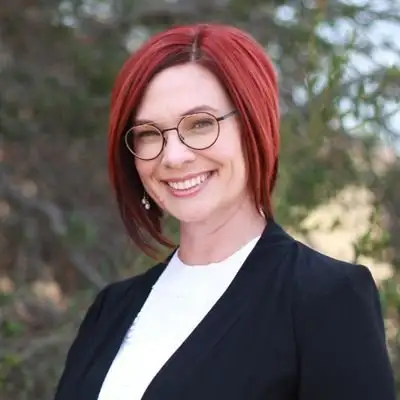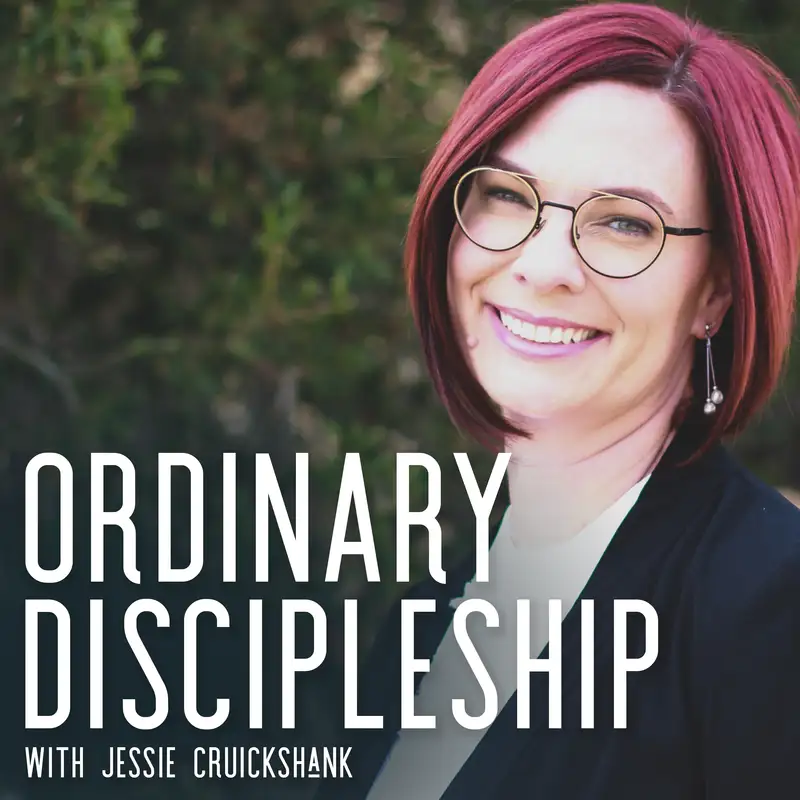How to Know When to Speak Up
Chris: Hey everybody, welcome to
another episode of ordinary
discipleship Podcast. I'm Chris,
that's Jacob, that's Jesse, and
today we are going to be talking
about, when do you speak up?
Maybe it's in a relationship,
maybe it's your husband or your
wife, and they say something
kind of disparaging, and you're
like, Should I check that
person. Now, should I just eat
that comment? Should I go to bed
resentful? Maybe it's something
happened at work, and you're
coming back home and you're on
the couch watching some Netflix,
and you go to your spouse and
you say, Man, should I should I
say something to Jerry? Because
Jerry's getting a little out of
control today, we talk about
knowing when to speak up. And
with that being said, I think
Jake, Jake, you said, We've got
to have God, God's eyes, God's
heart, God's tone, God's timing.
Jesse developed a special card
to walk you through it. Man,
what an episode today.
Jessie Cruickshank: So this is
actually, this actually is in
the book ordinary discipleship.
And it comes and I comes out of
a lesson that I learned in life.
I have the ability to see
things, to be aware of stuff.
You know, I it's just part of
how God made me. And when I was
in charge of the wilderness
ministry, like I would, gosh,
that person has this problem
that person needs like they're
fearful here, they don't trust
God there. Oh, wow, that's an
unhealthy dynamic they have with
other people. And I thought,
because I was like the disciple
maker in those relationships,
that it was my responsibility to
talk to everybody about their
stuff. My I thought it was my
responsibility to bring it up,
to point it out. Well, you know,
hey, I'm just going to show you
your blind spot right now. And
that's kind of the language that
people use. And it didn't go
well, like, ever, right? Ever.
In fact, one of the my co
leaders, the only fight we ever
got in was around a situation
where something perceiving
something, and I talked to
somebody else about it, because
I'm like, Oh my gosh, we got to
talk to this person, because
this is a big deal, and we need
to, we need to figure out how to
deal with it. And he comes in
and he's like, that's not your
place. That's not your right.
You're wrong. Actually, you
don't even understand what's
going on. And this is like a
super sweet human who never
yelled at anybody, and he's
yelling at me, and I just
couldn't understand. I'm like,
Oh my gosh. Like, this is I'm
actually for this other person,
right? I see something that's
bad. I care about them enough to
want to do something about it.
And I was really confused. So I
go and talk to my mentor, and
I'm like, Hey, I see this thing
that's not good. I brought it up
to somebody, right? Thought
that's what I was supposed to
do, and it blew up in my face.
In fact, now I'm in relational
rift with someone who doesn't
even like, like, I must have
really hurt him, because he
never gets in a relational
breath. And my mentor goes,
Okay, well, you think you're
seeing what God you think you've
seen what God has seen like you
think that what you're seeing is
accurate. And I'm like, yeah.
He's like, Okay, so do you love
this person? Do you care about
about who they are? And I'm
like, Yeah, I really care about
who they are. He's like, okay,
is God showing them this
situation? And I said, when no,
like, that's why I needed to go
talk to them about it. And he's
like, Wait a second. Do they
hear from God? Do they pray? Do
they follow God? And I was like,
yeah. He's like, okay, so if
God's not talking to him about
it, why are you Oh? And I was
like, oh, oh, like, like
somebody had just punched me in
the gut. I was like, wait, wait,
wait a minute. What? Like, I
thought that was my job. Like, I
thought that that God was
telling me so I could go talk to
them, because obviously they're
not listening to God and they're
not paying attention. And so he
has to tell me to be like his
wingman, because he's not
getting through so I got to do
it. And my mentor was like,
yeah, no, no, wow. In fact, he
said, If you ever talk to
somebody about something that
God is not talking you are
actually being disobedient. And
I was like, Oh my gosh, like I
had to rethink so much about my
leadership, about my
conversations, about the way I
thought I loved my friends well,
and I created this mantra to
help me know how long to keep my
mouth shut. And so for me, it's
that, you know, do you have
God's eyes? Do you have God's
heart? Do you have God's tone?
And added that one because,
like, oh, wait, sometimes God's
really gentle and sometimes
God's a little severe. So I also
need to be with him so much that
my tone. Tone matches this Holy
Spirit's tone. So even though
I'm angry or upset or am
intense, the Holy Spirit is
gentle. I gotta be gentle, and
so timing. And then when I have
all of those together,
Unknown: then I can speak up. I
just I'm thinking back to what
your mentor said to you in the
questions that she or he, I'm
not sure who it was he was
talking to you about. He's like,
so do you love this person?
You're like, yeah, yeah, yeah,
yeah. Is this person like
talking to God? Like, is praying
to God, speaking to God, hearing
from God? And I'm just curious,
like, if that answer would have
come back, like, No, I don't
know, you know. Like, I wonder
with because it's interesting,
because, like, Jake's dad, of
great pastor, Paul, would always
say, if somebody is not aware of
like, their sin, you got to
hammer them with the law and
make them feel like the guilt of
what they've gone through. But
he goes, most people know that
they're sinners, and so that's
why we've got to share the
gospel with them, like we've got
to be graceful and show them the
gospel. And it's only in those
like and I think back to a time
Jake and I had to visit this one
kid in prison who had murdered
his mom and buried her in a
church and and it was like the
first big time prison visit I
ever met. And I walked in, and I
sat down, and I could just feel
like the I could feel the pain
of all the souls in that
building. And it was just so
dark. And I sat down, and he sat
down, and it's like 12 hours, 24
hours after he had murdered his
mom, and he goes, Yeah, they're
calling me famous in here. And
I'm like, Oh my God. Like you're
famous because you killed your
mom. I like your card system. I
like the ability to to sit down
and say, Oh my gosh. Am I
mimicking the voice of the Holy
Spirit? Am I seeing that person
as somebody that is God's
creation, Am I doing it in a
loving way and walking beside
them? That's really important.
And I think what a wake up call,
and what a punch to the gut when
you thought as a young Christian
that I'm actually speaking as
I'm the voice, I'm like,
ushering in the voice of God.
And they're like, Yeah, you're
really not. You're just kind of
impeding the whole process. So
chill out, Jacob. What do you
think about this whole thing?
Yeah,
Jacob: I think what came to my
mind as Jesse was talking was
there's a way of talking about
ministry that I picked up in a
community I used to be a part of
where we said it's about coming
into agreement with the Holy
Spirit, okay? And so it's about
discerning what God is saying in
the moment. And then I don't
actually have to have to say
anything new. I just have to say
what God is saying. And so like,
the image in my mind is like, if
there's me and the person with
whom I'm ministering, and
there's God, it's about trying
to bring those, the three of us
into alignment. So like, if it's
somebody who's in need of a word
of hope, I don't have to conjure
one. I just have to help them
hear God's word of hope by
agreeing with the Holy Spirit.
If it's somebody who needs
confrontation, I don't have to
bring the confrontation, like
you said, they're already
experiencing the con, like the
condemnation of their sin. I
just have to come into agreement
with the reality of the moment,
fair and so. So I think what it
does is it takes pressure off,
because I don't have to show up
and and do something. I just
have to, I just have to find a
way to come into alignment with
what the Spirit is doing. So how
do you do that? God's eyes,
God's heart, God's tone, God's
timing. No,
Jessie Cruickshank: so Chris,
you would ask to ask the
question, what if they weren't
hearing from the Holy Spirit,
right? And, and I kind of
wrestled through that a little
bit in the conclusion that I got
to is like, who am I to judge?
How? How do I know what God is
saying to them in their heart,
in their innermost being, God's
dreams, like, I don't like, I
don't get to judge that
actually, in fact, like, it even
bothers me when other people are
like, well, I don't know. Maybe
that was just you and and, look,
I'm for testing a word, but I'm
not for and validating the way
that somebody else. So my answer
was, I can't judge their part.
All I can do is sit with the
Lord and work through my part
right, which is eyes, heart,
tone and timing. And so when I'm
struggling to answer the
question, Do I speak up or not?
Do I say something here? I
actually just use them as
journal prompts and say, Okay,
I'm going to sit with the Lord.
What do I do? I have God's eyes.
What do I see? And Holy Spirit,
what do you see? And are those
in alignment, like Jake said,
God's heart. Do I love them the
way that God loves them? Because
if I'm just trying to fix them,
then I don't love them the way
God loves them. If I'm if I'm
annoyed, if they're. Frustrating
me, if they're inconvenient, if
I feel triggered or harmed, I am
not loving the way them, the way
that God loves them. And so like
that one, that one doesn't check
off, you know? So I just use
them as journal prompts and and
sometimes I've come to the
conclusion that I'm too in this
situation. I'm too affected by
the situation to be the person
who speaks up, because I can't
get to the place where I can
just be in alignment with the
Holy Spirit and not be upset in
this situation, and the tone is
something I can't figure out how
to get to. Now I'll keep doing
my work with the Lord to get
there and forgiveness processes
and things like that. But it may
sometimes, I'm like, God, you
got to send them somebody else,
because it's just not me. Yeah,
it's not me. I can't do this.
Then I can turn that into
praying for them and just
saying, God, you gotta, you
gotta send somebody else.
Unknown: I was a part of a
discipleship community. I
mentioned it before, like a
mission team I was a part of for
a year, and so we were in teams
of seven, and we traveled
together, and we served
together, and we often lived in
the same place together. So we
spent a lot of time together,
but we had, like, a regular
practice of feedback a couple
times a week, and we had a
couple of rules. One was like,
if somebody gave you feedback,
the first thing you had to say
was Thank you, and if you had a
reaction, you couldn't give it
right. Then that was an initial
rule. It got a little we flexed
on that one a little bit
eventually. But then the other
rule was the 24 hour rule, which
was like, if you have something
to say, you have to say it
within 24 hours. Now, the
expectation was that you were
using the time to prepare, and
that would be like we didn't
have this language in that
community, but that would be
when you're journaling God's
eyes, God's heart, God's tone,
God's timing, and you're
preparing to offer the feedback
to the other person in a way
that you're hopefully coming
into alignment with what God is
already saying to them in my
community now, like as a part of
a church, I don't see people
nearly as often as I did when I
was on that ministry team. So I
don't use a 24 hour rule,
because I just don't see them
often enough, but I will give
myself a deadline, like, I need
to have this conversation before
x point, or I know we have this
meeting coming up, I need to
have a one on one conversation
before that meeting. And that'll
that gives me some
accountability to do the work I
need to do to make sure that
what I'm communicating is being
communicated with God's eyes,
God's heart, God's telling,
God's timing.
Jessie Cruickshank: So I think
about doing this like in a work
right? Because, because most of
us have jobs, and most of us are
out there and like, this is a
big deal in our work
environments. Like, what do you
what do you say? What do you you
know, do you stand up for
yourself? Do you not? Do you
just absorb it? And like, Oh,
they're having a bad day, right?
And so using these journal
prompts with with family and
coworkers, for me, has been
super helpful, because, like,
like, Jacob said, I'm like,
okay, maybe I'm supposed to hold
space with this, but I want to
do that because God has asked me
to not because I don't think
that my opinion or perspective
is valid or valuable, right? I
don't want to absorb it because
I'm somebody's punching bag. I
want to absorb it because I
stand with Christ, who died on
the cross, and I can say, You
know what? I can, I can, I can
take this and give it back to
Jesus. So I don't resist saying
something because I agree with a
narrative that's not true. I
resist saying something because
I'm agreeing with God's story.
And God's story says, Wait, hang
on, I've got grace for you in
this. Or God's story is like,
you know what? It's time to say
something, and there's grace to
do it with his tone, and he's
showing you that timing. And the
timing is, usually they bring it
up first. It's, it's hardly ever
like 1% a confrontive, you know,
blind spot kind of conversation.
Usually I wait for the teachable
moment or for them to say
something, and I'm just
confirming because that's a life
giving conversation while
punching somebody in the face
with their blind spot or
something they did in an
accusational way. That's not a
life giving conversation. God's
got to redeem that
Unknown: right? So when to speak
up, when to hold back. God's
heart, God's eyes, God's mind,
God's what I almost got it,
God's eyes, okay? God's tone and
God's timing. That's how you do
it. Right there in the middle of
that delightful sticker is the
huology logo. I think that's
gonna do it for this episode. I
think we've kind of hammered it
out. I think we've got it
figured out now. So thank you
guys so much for joining us to
for the ordinary discipleship
podcast. And if you liked this
episode, make sure to share it
on your socials. Make sure to
review it. Make sure to give us
five. Of stars and Jesse. If
they want to know more about the
amazing work you do with the
kingdom through hoology, what
can they do? We're
Jessie Cruickshank: going to
share out Jacob's cell phone and
email address so they can just
reach out to him anytime he's
available. 24/7, especially for
counseling problems and church
hurt conversations. So if you
want him to come talk to your
pastor, please give him a call.
He's really good at that. But if
for whatever reason, that number
or that email address just don't
seem to be working, you can
always find us@houology.co
that's W, H, O, o, l, o, G,
y.co.
Unknown: Awesome guys, thank
you. Jacob Jesse, we will see
you next time on the ordinary
discipleship podcast. God bless
and we'll talk to you soon. Bye.
You.
Creators and Guests


